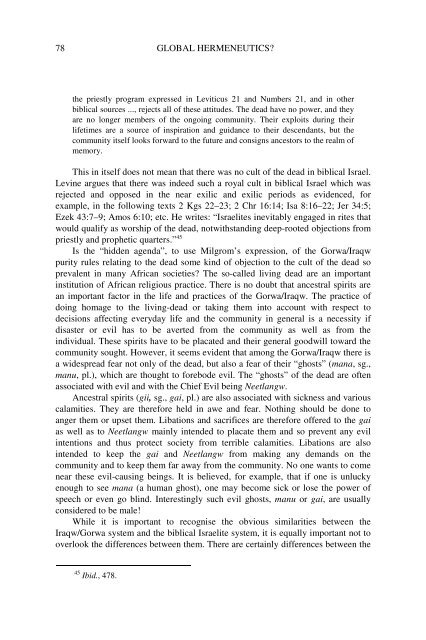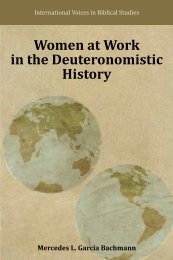Global Hermeneutics? - International Voices in Biblical Studies ...
Global Hermeneutics? - International Voices in Biblical Studies ...
Global Hermeneutics? - International Voices in Biblical Studies ...
Create successful ePaper yourself
Turn your PDF publications into a flip-book with our unique Google optimized e-Paper software.
78 GLOBAL HERMENEUTICS?<br />
the priestly program expressed <strong>in</strong> Leviticus 21 and Numbers 21, and <strong>in</strong> other<br />
biblical sources ..., rejects all of these attitudes. The dead have no power, and they<br />
are no longer members of the ongo<strong>in</strong>g community. Their exploits dur<strong>in</strong>g their<br />
lifetimes are a source of <strong>in</strong>spiration and guidance to their descendants, but the<br />
community itself looks forward to the future and consigns ancestors to the realm of<br />
memory.<br />
This <strong>in</strong> itself does not mean that there was no cult of the dead <strong>in</strong> biblical Israel.<br />
Lev<strong>in</strong>e argues that there was <strong>in</strong>deed such a royal cult <strong>in</strong> biblical Israel which was<br />
rejected and opposed <strong>in</strong> the near exilic and exilic periods as evidenced, for<br />
example, <strong>in</strong> the follow<strong>in</strong>g texts 2 Kgs 22–23; 2 Chr 16:14; Isa 8:16–22; Jer 34:5;<br />
Ezek 43:7–9; Amos 6:10; etc. He writes: “Israelites <strong>in</strong>evitably engaged <strong>in</strong> rites that<br />
would qualify as worship of the dead, notwithstand<strong>in</strong>g deep-rooted objections from<br />
priestly and prophetic quarters.” 45<br />
Is the “hidden agenda”, to use Milgrom’s expression, of the Gorwa/Iraqw<br />
purity rules relat<strong>in</strong>g to the dead some k<strong>in</strong>d of objection to the cult of the dead so<br />
prevalent <strong>in</strong> many African societies? The so-called liv<strong>in</strong>g dead are an important<br />
<strong>in</strong>stitution of African religious practice. There is no doubt that ancestral spirits are<br />
an important factor <strong>in</strong> the life and practices of the Gorwa/Iraqw. The practice of<br />
do<strong>in</strong>g homage to the liv<strong>in</strong>g-dead or tak<strong>in</strong>g them <strong>in</strong>to account with respect to<br />
decisions affect<strong>in</strong>g everyday life and the community <strong>in</strong> general is a necessity if<br />
disaster or evil has to be averted from the community as well as from the<br />
<strong>in</strong>dividual. These spirits have to be placated and their general goodwill toward the<br />
community sought. However, it seems evident that among the Gorwa/Iraqw there is<br />
a widespread fear not only of the dead, but also a fear of their “ghosts” (mana, sg.,<br />
manu, pl.), which are thought to forebode evil. The “ghosts” of the dead are often<br />
associated with evil and with the Chief Evil be<strong>in</strong>g Neetlangw.<br />
Ancestral spirits (gii, sg., gai, pl.) are also associated with sickness and various<br />
calamities. They are therefore held <strong>in</strong> awe and fear. Noth<strong>in</strong>g should be done to<br />
anger them or upset them. Libations and sacrifices are therefore offered to the gai<br />
as well as to Neetlangw ma<strong>in</strong>ly <strong>in</strong>tended to placate them and so prevent any evil<br />
<strong>in</strong>tentions and thus protect society from terrible calamities. Libations are also<br />
<strong>in</strong>tended to keep the gai and Neetlangw from mak<strong>in</strong>g any demands on the<br />
community and to keep them far away from the community. No one wants to come<br />
near these evil-caus<strong>in</strong>g be<strong>in</strong>gs. It is believed, for example, that if one is unlucky<br />
enough to see mana (a human ghost), one may become sick or lose the power of<br />
speech or even go bl<strong>in</strong>d. Interest<strong>in</strong>gly such evil ghosts, manu or gai, are usually<br />
considered to be male!<br />
While it is important to recognise the obvious similarities between the<br />
Iraqw/Gorwa system and the biblical Israelite system, it is equally important not to<br />
overlook the differences between them. There are certa<strong>in</strong>ly differences between the<br />
45 Ibid., 478.




